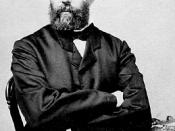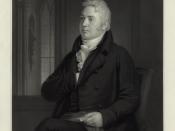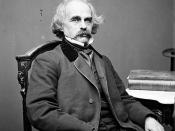Transcendentalism an idealist philosophical tendency among writers in and around Boston in the mid 19th century. Growing out of Christian Unitarianism in the 1830s under the influence of German and British romanticism. Transcendentalism affirmed Kant principle of intuitive knowledge not derived from the senses, while rejecting organized religion for an extremely individualistic celebration of the divinity in each human being. The transcendentalists' manner of interpreting nature in symbolic terms had a profound influence on American literature of this period, notably in the works of Nathaniel Hawthorne and Herman Melville. This movement is often, regarded as a delayed manifestation of Romanticism.
Historically, the stern theology of the Puritans may have been absolutely necessary to make them work with singleness and an inflexibility of purpose to lay the foundations of a mighty republic; but this very singleness of aim had led to a narrowness of culture which had starved the emotional and aesthetic nature.
Art, music, literature, and the love of beauty in general had seemed reprehensible because it was thought that they took away the attention from a matter of far graver import, the salvation of the immortal soul. Now there gradually developed the conviction that these agencies not only helped to save the soul, but made it more worth saving. People began to search for the beautiful and to enjoy it in both nature and art. Emerson says: "... if eyes were made for seeing, Then Beauty is its own excuse for being." The years from about 1820 until the Civil War, and the 1840s in particular, witnessed a heightened awareness of a range of social issues - in which the antislavery movement was the most visible reform movement of the period- and gave rise to a number of active social reform movements including the intolerable working conditions and women...


